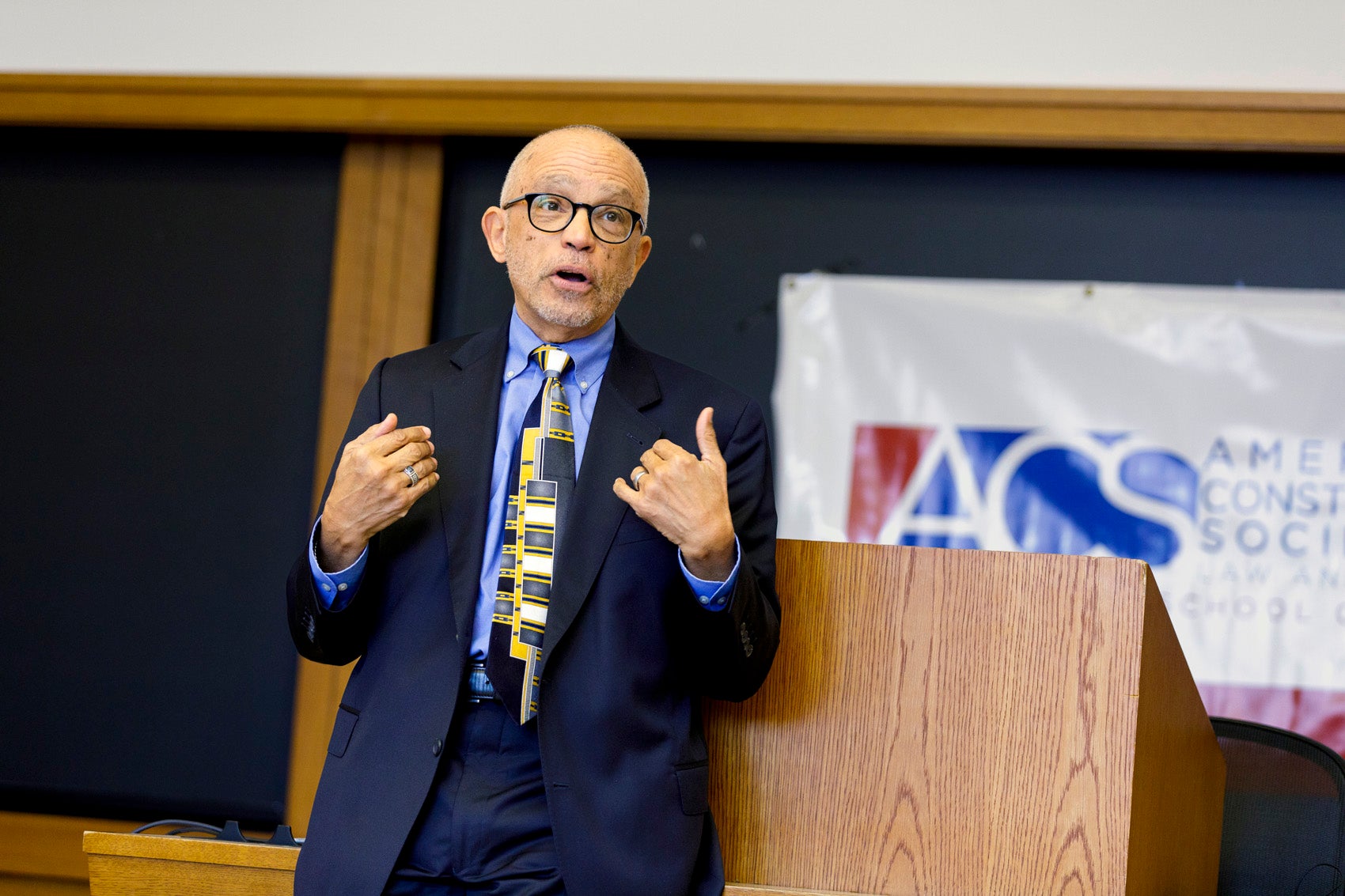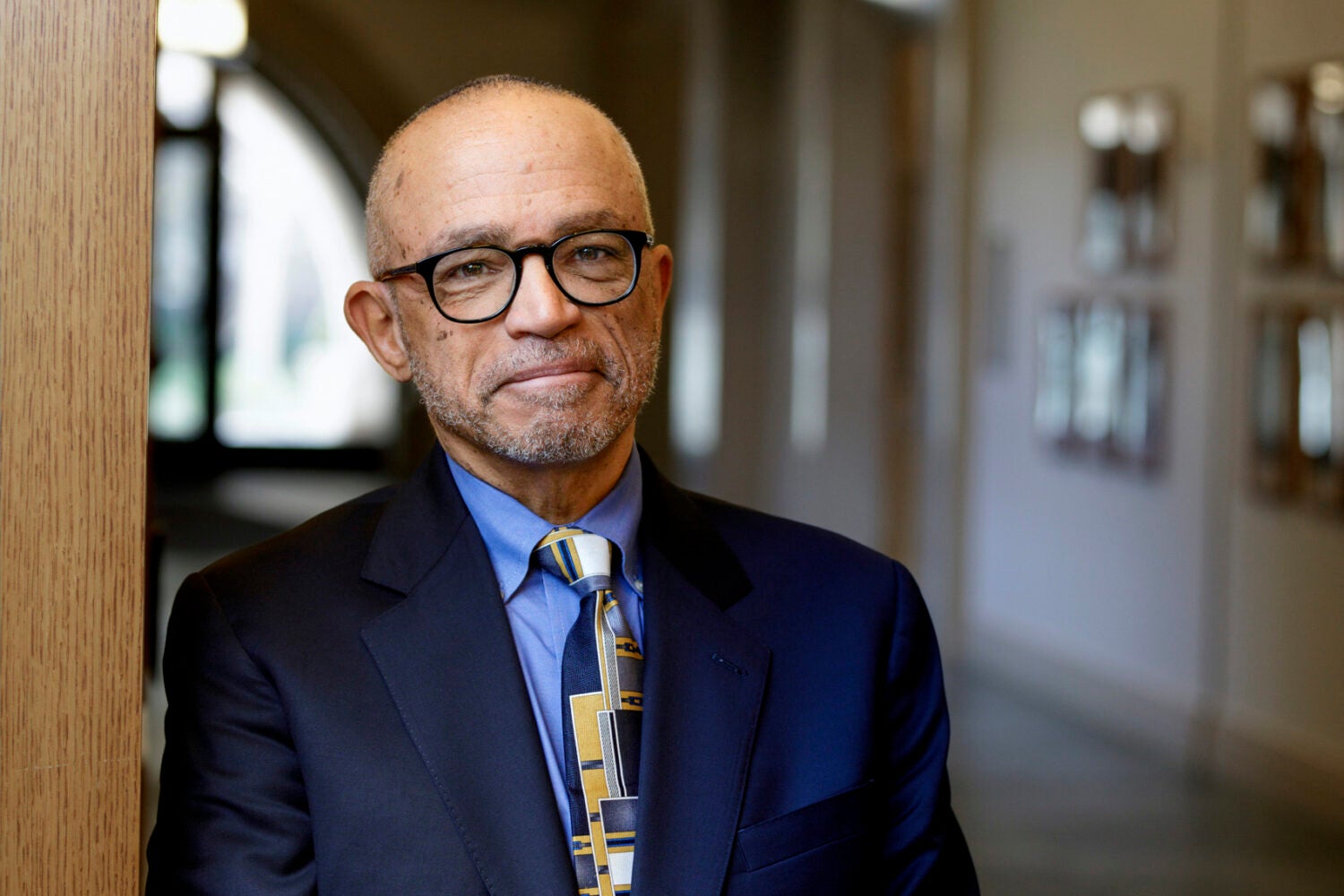In 1980, five Black women in Chattanooga, Tennessee, were wounded when local members of the Ku Klux Klan shot at them from a moving car as the women were waiting for a taxicab. Although the assailants were eventually arrested and charged with attempted murder, two of the men were acquitted by an all-white jury. A third attacker was convicted on lesser charges and sentenced to nine months in prison.
Randolph M. McLaughlin ’78, who worked at the Center for Constitutional Rights in New York City, heard about the case as protests against the verdicts erupted across the Southern city. As a relatively new attorney, McLaughlin with his colleagues agreed to represent the women — dubbed the Chattanooga Five — in a civil lawsuit against the Klansmen, in the hopes of achieving some measure of justice for the victims.
McLaughlin and his team decided to deploy a novel legal strategy they had devised based on a Reconstruction-era statute — a successful approach that would become a blueprint for others hoping to bankrupt and destroy the hate group.
This penchant for creative lawyering and for innovative civil rights work was not unusual for McLaughlin, who is now a professor at Pace University’s Elisabeth Haub School of Law and co-chair of the civil rights practice group at Newman Ferrara in New York.
In fact, it has defined his career.
Legal ambitions
As far back as McLaughlin can remember — since middle school, at least, he says — he knew he wanted to be a lawyer. As a kid, he was a fan of television shows illustrating how integral lawyers were to society, how they could help people. Among his favorites was “Judd, for the Defense,” a legal drama about a defense attorney who accepted difficult cases dealing with controversial topics.
As a high school student in the late 1960s, McLaughlin again witnessed how the law could effect change, in an era when radical attorneys were leading the charge against racism, discrimination, and segregation. “At this time, civil rights lawyers were all over the news,” he says. “And chief among them, in my mind, was William Kunstler.”
Kunstler, a civil rights and anti-war attorney who co-founded the Center for Constitutional Rights, had become known for his defense of the Chicago Seven — young activists indicted for protest activities during the 1968 Democratic National Convention.
McLaughlin was determined to work with Kunstler someday. As a student at Harvard Law School, he absorbed all he could about constitutional law, civil rights, and labor law. The course he took on race and racism in American law with Derrick Bell, the legendary civil rights attorney and the law school’s first tenured Black professor, was especially eye-opening and motivating, he recalls.
“I’ll never forget when Bell talked about how, in the school desegregation fight, the folks who sued knew that the change they wanted to see would not happen for them. They knew that they were sacrificial lambs, that their children were being sacrificed for the greater good,” he says.
It was crushing to consider the Black children sent into schools in Little Rock, Arkansas, or Boston, or elsewhere in the country, who were harassed, beaten, and pelted with racial slurs, he says. “That really made me angry — to sacrifice children. They shouldn’t have had to go through that. We should have sacrificed ourselves for them, not the other way around.”
It was also at Harvard that McLaughlin had an opportunity to meet his legal idol: William Kunstler.
Kunstler had come to the law school to deliver a talk, one that McLaughlin says left him stunned: “He said something that really shocked me. He said, ‘We drink racism in with our mother’s milk.’ He also said, ‘I need Black lawyers to work alongside me, because you will understand these issues in a way maybe I can’t.’”
Afterward, McLaughlin was among the last people in the room as he approached the stage. “Don’t ask me how, because to this day, I don’t remember how I got up there,” he says. “There were all these Black Panthers, Native Americans, and other activists there — and then there was little old me.”
He told Kunstler that he wanted to build a career like his. “And he responded by telling me to look him up when I got to New York — so I did.” Kunstler gave McLaughlin his first job out of law school, at the Center for Constitutional Rights, where he taught him how to be an effective trial lawyer — and where McLaughlin encountered one of the first consequential cases of his career.

A plan to defeat the Klan
When the center took on the Chattanooga Five as clients, McLaughlin knew that the suit was not only an opportunity to achieve justice for the women, but also a chance to halt further terrorism against the city’s Black residents.
Conceiving the strategy, he insists, was a group effort. But McLaughlin, who had studied history in college, had a personal interest in the post-Civil War and Reconstruction eras. “After the Civil War was over, some Southerners took off their grey uniforms and put on white robes,” he says. “They were using guerrilla tactics to terrorize. And we’re not just talking former soldiers: We’re talking judges, jurors, cops, sheriffs — they were all Klansmen.”
To empower the government to protect the civil rights of Black Americans, Congress passed the Ku Klux Klan Act of 1871, the third of three so-called Enforcement Acts, all aimed at guaranteeing the basic liberties enshrined in the 13th and 14th Amendments, including the freedom to vote and equal protection under the law. “It gives the victims of Klan violence the ability to sue their terrorists, where there is a conspiracy with two or more to interfere with civil rights,” says McLaughlin.
“We literally had to write this case out of whole cloth.”
Although the statute had been used before in criminal prosecutions of the Klan, McLaughlin and his team were the first to apply it in civil court. “We literally had to write this case out of whole cloth, because there was nothing for us to base it on,” he says.
The idea worked, and McLaughlin and his colleagues won their landmark case, obtaining monetary damages and a moral victory for the Chattanooga Five. But just as important, the team won an injunction which permanently barred the Klansmen from further violence. “After this injunction was issued, there has not been, to my knowledge, one single incident of Klan violence in Chattanooga,” he says.
After the case was over, McLaughlin wrote a book outlining for other attorneys his team’s litigation strategy — an approach that was used recently against organizers of the 2017 “Unite the Right” rally in Charlottesville, Virginia. (His story is also the subject of a new short film, “How to Sue the Klan.”)
“Essentially, this statute was used to bankrupt the Klan all across the country,” says McLaughlin. “The Klan is no longer a real force to be reckoned with. We have other groups now, but the Ku Klux Klan is pretty much gone.”
Defining a career
That early triumph set the tone for McLaughlin’s legal work. Since then, he has used civil litigation to battle police misconduct, attacks on voting rights, illegal searches and seizures, labor law violations, and more. Beyond his work with the Chattanooga Five, he says he is particularly proud of two cases.
The first, against the town of Hempstead in New York, challenged the municipality’s at-large system for Town Board elections, which McLaughlin argued disenfranchised Black and Latino voters and violated the Voting Rights Act. The courts eventually agreed, forcing the town to modify its system and setting an important precedent in the 2nd Circuit Court of Appeals. “We used that case for the next 20 years to file one suit after another against one municipality after another for similar transgressions,” he says.
In another life-changing case, McLaughlin helped victims of childhood sexual abuse take advantage of a New York state law that allowed them to sue their alleged abusers even after the limitations period for such claims had passed. The lawsuit, filed against a former teacher, ended in a settlement — and an eventual federal indictment. “Sitting and listening to these young women describe what had happened to them, what they had gone through, was the most gut-wrenching thing I’ve ever been involved in,” he says. “To get a settlement for these women, and to know that this man is going to prison for a very long time, was very satisfying.”
Today, as an attorney, McLaughlin continues to pursue cases with an impact, something he also encourages his students to do as a professor of law. And like Judd, the TV lawyer, and William
Kunstler, his old mentor, McLaughlin still refuses to shy away from difficult cases. “I want to show that with civil rights work, if you are careful about the cases you select, you can do good and do well at the same time,” he says.
